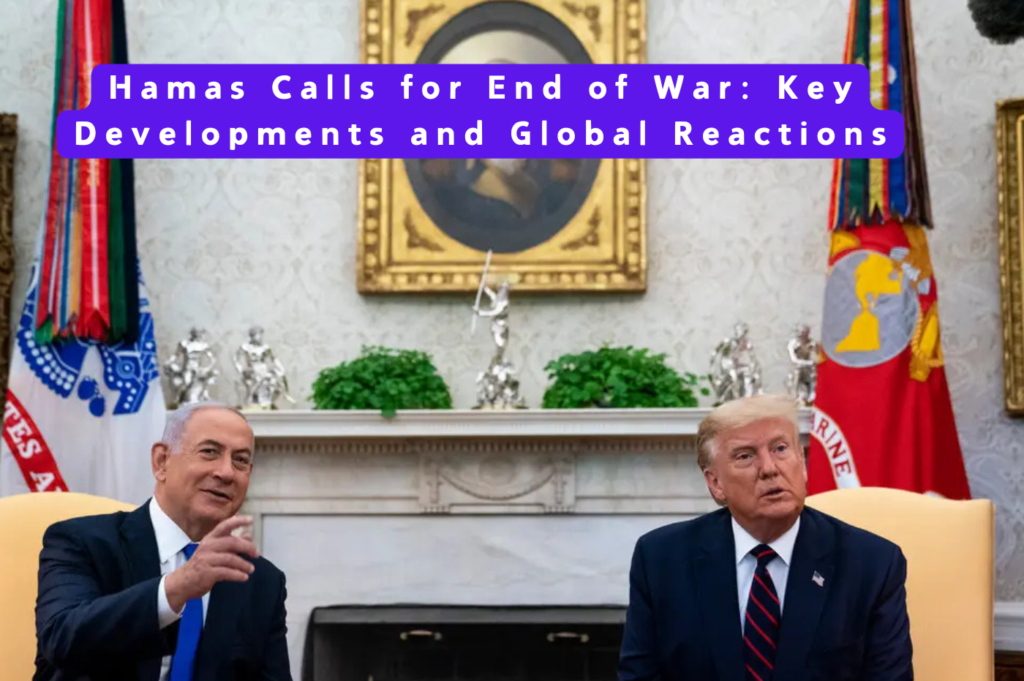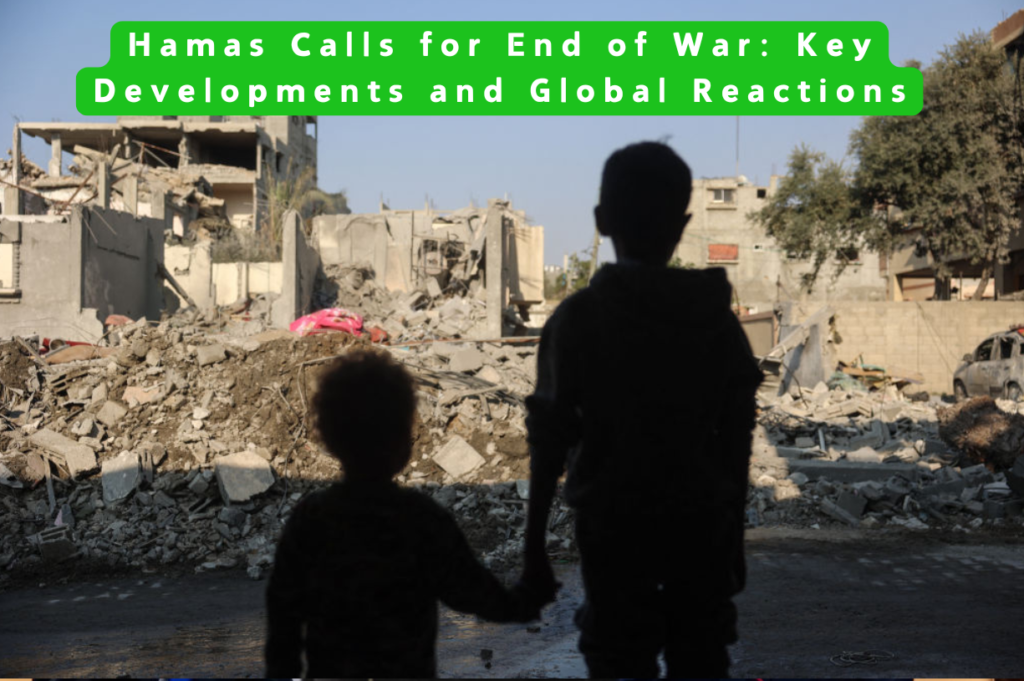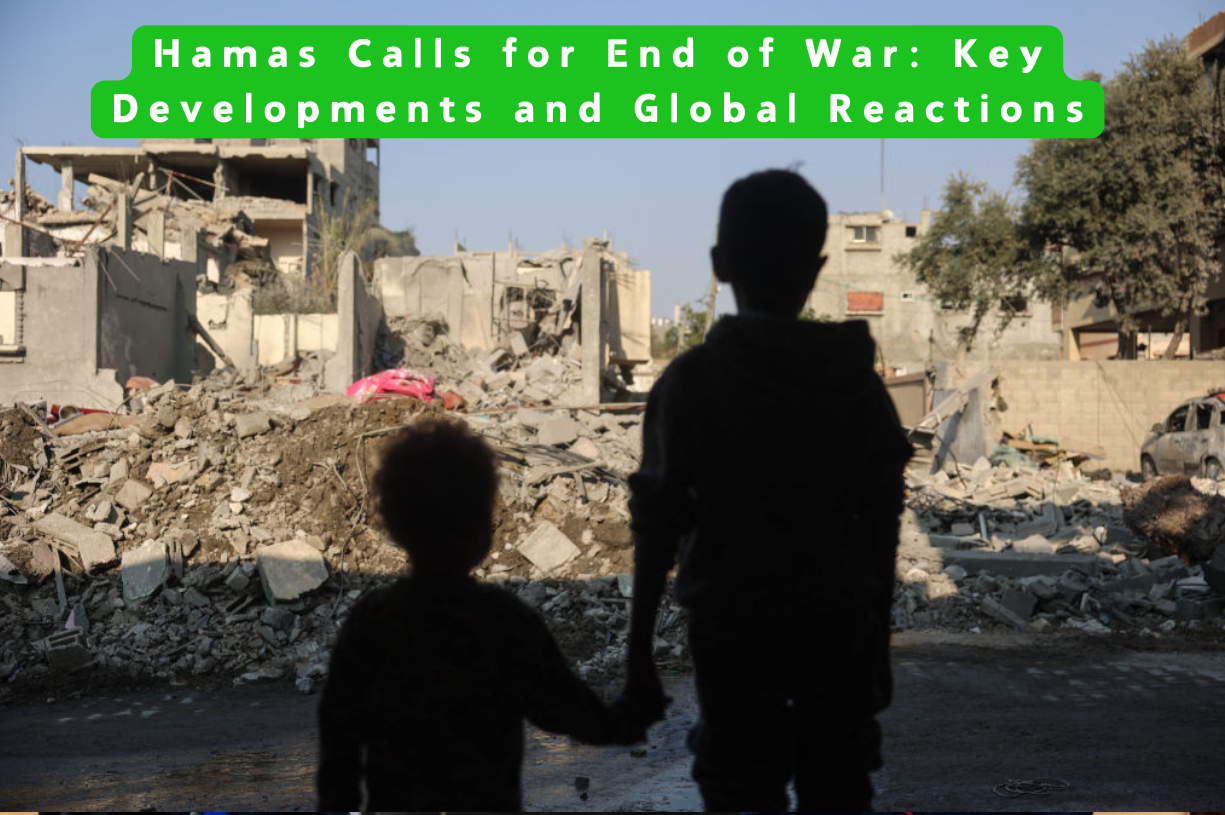Hamas Calls for End of War: Key Developments and Global Reactions

The recent call from Hamas to end the current conflict between Israel and Palestine has reignited discussions on achieving peace in a region fraught with tension for decades. This development follows a period of intense hostilities, with heavy casualties and widespread destruction affecting civilians on both sides. With growing international pressure and the humanitarian toll mounting, Hamas’ appeal to cease the fighting has brought attention from global leaders, human rights organizations, and civilians worldwide who are desperate for a peaceful resolution.
Hamas Calls for End of War: Key Developments and Global Reactions
Understanding the Conflict
The Israel-Palestine conflict has deep historical roots, with disputes over territory, religious sites, and national identity spanning more than a century. At the heart of the conflict is the division over land claimed by both Israelis and Palestinians. Following the establishment of Israel in 1948, a series of wars, territorial occupations, and uprisings have kept peace efforts tenuous at best. Hamas, an Islamist political and militant organization, took control of the Gaza Strip in 2007 and has since been a central actor in the hostilities, frequently clashing with Israeli forces in cycles of violence.

The Catalyst for Current Hostilities
The recent escalation of hostilities can be traced to a series of events that intensified existing tensions. Both Israel and Hamas have pointed to the other’s actions as provocations, resulting in cross-border violence, rocket exchanges, and military responses. Events that contributed to this escalation include disputes over sacred sites, regional political developments, and humanitarian grievances. Each escalation in the conflict has only deepened the distrust between the two sides, further complicating the pursuit of peace.
Hamas’ Recent Call for a Ceasefire
In a surprising development, Hamas leadership issued a statement calling for an end to the current war. This call for peace is notable, as it reflects a shift from Hamas’ previous hardline stance on Israel. Leaders from within Hamas have urged for a temporary halt to hostilities, citing the severe humanitarian toll on Palestinian civilians. While some analysts interpret this as a strategic move, possibly to gain international sympathy or ease Gaza’s humanitarian crisis, others see it as a genuine step toward easing the suffering in the region.
Global Reactions to Hamas’ Statement
The international community has been quick to respond to Hamas’ appeal for peace, though reactions have been mixed. Several Middle Eastern nations, including Egypt and Qatar, have expressed support for any measures that can bring an end to the violence, as both countries have previously acted as intermediaries in the conflict. Western nations, particularly the United States and European Union members, have welcomed the call cautiously, emphasizing the need for both sides to show commitment to a sustained ceasefire.
Israel’s Position on Ceasefire Talks
Israel has reacted cautiously to Hamas’ call for a ceasefire. Israeli officials have highlighted concerns about Hamas’ previous ceasefire violations and have emphasized that any peace efforts must prioritize Israel’s security interests. Israeli leaders insist that Hamas must demonstrate a genuine commitment to peace by ceasing all military operations and allowing humanitarian aid into the Gaza Strip without interference. For Israel, any ceasefire agreement must come with stringent guarantees against further rocket attacks and tunnel activities used for militant purposes.
Humanitarian Crisis in Gaza
The humanitarian crisis in Gaza is at the heart of the current urgency for peace. With thousands of civilians killed or injured and infrastructure severely damaged, the call for a ceasefire is underscored by the dire conditions on the ground. Hospitals are struggling to care for the injured, and basic necessities such as food, water, and electricity are becoming increasingly scarce. The international community, including the United Nations, has called for unrestricted humanitarian access to aid Gaza’s vulnerable population.
Role of International Organizations
The United Nations and various non-governmental organizations have been actively involved in calling for a ceasefire and providing aid to the region. UN representatives have highlighted the disproportionate impact of the conflict on civilians, particularly children, and have urged both Israel and Hamas to respect international humanitarian law. Humanitarian organizations are working to deliver essential supplies, though access to affected areas remains a challenge due to the ongoing violence and restrictions on movement.
Mediation Efforts by Neighboring Countries
Countries in the region, especially Egypt and Qatar, have played pivotal roles in mediating ceasefires in past conflicts between Hamas and Israel. Egypt, with its proximity to Gaza and ties with both parties, has often been a key negotiator, coordinating talks and facilitating humanitarian access. In recent days, Egyptian diplomats have renewed their efforts to bridge the gap between Hamas and Israel, pushing for an immediate cessation of hostilities.
US and European Union’s Stance
The United States, a close ally of Israel, has expressed conditional support for a ceasefire, stressing that Israel has the right to defend itself but urging both parties to prioritize civilian lives. The European Union has echoed similar sentiments, with member states calling for a peaceful solution and offering to support mediation efforts. Both the US and EU are also working with regional allies to foster dialogue, though they face challenges in addressing the deeply rooted issues at the heart of the conflict.
Challenges in Implementing a Ceasefire
Achieving a lasting ceasefire is complicated by several factors, including military, political, and ideological barriers. Both sides have deep-seated grievances and fear that any compromise may compromise their long-term security and political standing. Ensuring that all factions within Hamas adhere to a ceasefire and that Israeli military operations cease would require careful, sustained efforts from mediators and international stakeholders.
Human Rights Concerns and Accusations
Human rights organizations have documented numerous allegations of abuses by both Hamas and Israel during the conflict. Civilian casualties, destruction of homes, and attacks on medical facilities have raised questions about compliance with international law. These organizations are advocating for independent investigations into possible war crimes and are calling on both sides to prioritize civilian protection in any future agreements.
Public Sentiment in Israel and Palestine
Public sentiment on both sides is a mix of exhaustion, grief, and anger. Many Palestinians in Gaza are calling for an end to the violence, as they endure daily threats to their safety and livelihoods. Meanwhile, Israeli civilians, particularly those in areas close to Gaza, fear ongoing attacks and feel insecure without concrete assurances of safety. Both populations are increasingly vocal about their desire for peace but remain skeptical about whether current leaders can deliver it.
The Path Forward for Lasting Peace
The path to lasting peace requires addressing the root causes of the conflict, including territorial disputes, security concerns, and humanitarian issues. International diplomacy, multilateral peace talks, and perhaps a new approach to power-sharing could be potential solutions to this longstanding conflict. Sustainable peace will also require building trust between Israelis and Palestinians, which may only be achievable through gradual, confidence-building measures over time.
Conclusion
The recent call by Hamas to end hostilities marks a significant moment in the Israel-Palestine conflict, though the path to a peaceful resolution remains complex. With regional actors and international powers urging both sides to commit to peace, there is cautious optimism that a temporary truce might lead to broader discussions. However, achieving true and lasting peace will require addressing the underlying issues that fuel the conflict, demanding compromise, and dedicated efforts from all involved.






